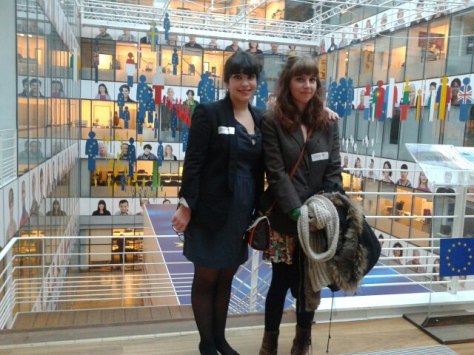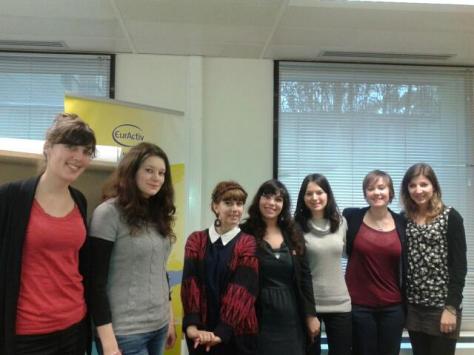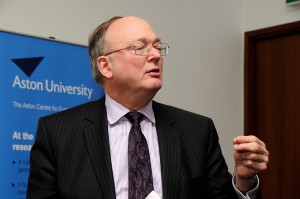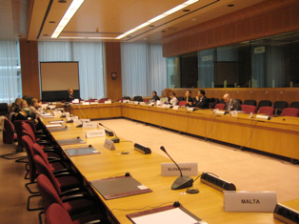
Guest blog post by Rebecca Brown, MA Student
Day 1
Armed with suit-filled suitcases and 3 months’ worth of intensive EU based knowledge, the intrepid explorers from 2012’s International Relations MA group set out on a journey that saw them at first battling a snowstorm- all in the name of adventure and education of course.
In the days leading up to our departure, the question on everybody’s lips had been; “will we make it to Brussels?” But the poor weather was no match for our steely determination! So armed with coffee, fluffy coats, plenty of reading material and a game of Connect-Four; we began our journey to where Monnet, Schuman, Churchill and others had made history nearly 65 years before.
At the Eurostar, Simon Smith and the students met with Carolyn Rowe and we made our way through security to await news about our delayed train.
We had chosen an exciting time to visit Brussels; President Obama was due to be inaugurated for his second term, the Euro continued to tumble into the depths of crisis and Prime Minister David Cameron had been due to deliver a speech, declaring an EU-opt in or out referendum for UK citizens if they chose to have him as their leader for a second term.
Studying Political Science is a gift really, because you understand more about how a country or region is powered, politically, culturally and economically. This trip to Brussels would give us a first-hand look at how our European Union is powered, and answer the many questions that we had.
But anyway, for now we were just happy to finally get on the train and make it to Brussels despite the heavy snowfall.
When at last we arrived in Brussels, we began the treacherous journey through the snow with our suitcases to our fabulous hotel. It felt like the journey had lasted an eternity, but at least we got some good exercise- and the hotel was certainly worth the wait. We didn’t take long to test the comfy beds!
But there was no time to waste, and soon we were touring the city in search of Simon’s friend, Mannequin Pis, and for a great bar to sample the delicious local beer.
Simon led us into an Alice in Wonderland type location where the walls were decorated with retro dummies and puppets while Glenn Miller and Plastic Bertrand songs played on a loop. Then after getting our fill of scrumptious food and tasty beer, we headed off home to get a good nights rest in preparation for our early morning visit to the European Commission.
Day 2
After a hearty, croixant-filled breakfast, we made our way through rabbit-covered metro stations to the oldest and one of the most important EU Institutions, The European Commission. Originating in 1951, it was known as the High Authority and led by President Jean Monnet during the time of the European Coal and Steel Treaty. Here is where the process of legislation begins its journey towards changing the lives of all Europeans, so it was rather exciting!
We were fortunate to listen to two fascinating presentations during our visit, the first given by Mr. Emanuele Giaufret, Managing Director of North Africa, Middle East, Arabian Peninsula, Iran and Iraq at the European External Action Service. His presentation covered the European Union and its Relations with the Middle East and North Africa.
He explained to us the reasons behind the Arab Spring, the consequences it has had for the people and what the EU is doing to improve relations between the areas in question. The news paints a very bleak picture, but Mr Giaufret concentrated on the positive effects that the EU has had in helping these places, such as aiding talks that convinced Tunisia to have its first democratic election in 2011.

Our second talk concerned European integration and EU enlargement, with regards to Iceland. Our speaker was the charismatic Mr.Willem Noë, Policy Officer in European integration for Iceland. Mr Noë, who had himself been on the team who got Slovenia into the EU, explained to us about the processes a country must go through before becoming part of the European community. We learned about the Acquis Communitaire and discussed the case of Iceland and other possible candidate countries with the boundaries that needed crossing before accession.
The next part of our adventure saw us visiting NATO headquarters, which turned out to be a little bit like being in a Bond movie! Security was tight, and we swiftly handed over passports and electronic devices and passed through scanners before being taken to a conference room. Although, despite the serious security measures, the NATO team were really quite friendly and we were spoiled with presents! We were given two presentations; an insight into NATO’s current political agenda and its emerging security challenges, and another which spoke about working for NATO. Our trip was made even more exciting when we exited, as we experienced the procedure for a real security breach at NATO headquarters- which made it even more like being in a spy movie.
That night we ventured out to sample the local nightlife and celebrate the birthday of one of the students. We ate the most delicious pizzas ever (the Italian’s will be furious to read that) and tasted the beer at Brussels’ most famous bar Delirium!

Tuesday was a very busy day indeed! The third day saw us visiting an ex-pupil of Simon, James Allen, who now works as a policy advisor for renowned Lobbying Company CBI, accompanied by an intern. Here, we experienced the first instalment of our encounter into the life of a lobbyist worker and what they do, as well as hearing things from the point of a view of an intern. A lobbyist works and speaks on behalf of the individuals or companies who seek to influence policy-based decisions made by the government, so that the decision made is one which doesn’t stunt the growth or development of the subject in question.
Our journey continued next with a trip to the European Council building.
Created informally in 1975, the European Council became an official EU institution in in 2009 after the Treaty of Lisbon came into effect, where it was given the task of “the general political directions and priorities” of the EU. This institution gives final approval to policies made, after they’ve passed through the Commission and Parliament.

We got to experience the genuine setting of a European Council meeting and listened to a presentation about the institution from an EU interpreter, who explained a little bit about how it all works and what his job is like.
To finish off the day, we visited the British Embassy in Brussels, where Robert Tinline, Deputy Head of Mission and Gwen Edwards, Senior Parliamentary Officer, spoke to us about the role the UK plays within the EU, and their thoughts about euro-scepticism along with their predictions about a possible UK Referendum.

That night, we were sooooo tired that only the bravest individuals went out to party. For the rest of us, it was a night in bed with Vietnamese takeaway and terrible TV game-shows!
Day 3
The third day saw the Aston team pay a morning visit to the Committee of the Regions building to learn about the vital role they play with voicing the subnational views within the EU.
Established in 1994, the Committee of the Regions sought to represent the large percentage of EU legislation made at a regional level, with an additional goal to unite the gap between the public and the process of integration within the EU. We received a presentation which offered first-hand insight into working in the world of the CoR from the eyes of a translator.
Shortly after, we were lead to a very stylish building, home of renowned Burson Marsteller lobbying group, who work with big companies such as Johnson & Johnson and Ford, as well as many others. Founded by Harold Burson and Bill Marsteller in 1953, it now has 71 offices in 98 countries and is one of the largest PR groups in the world.
We were all sat in a grand looking conference room and given an insightful and frank talk about the pros and cons of working in the exciting world of lobbying along with the experiences of working for such a large and well-respected company.
We had a few hours to kill before invading a European Parliament committee, so we found ourselves a nice pub and ordered raspberry beer and chocolate waffles before heading off to The Parliamentarian, or ‘EU fun land’ as one student called it. We had a wonderful time being big kids and playing with the interactive toys!
We were fortunate to be invited into a real Parliamentary Committee conference, where the newly elected Irish presidency teams spoke about their plans for EU economic growth and the increasing problems with internet security. Sadly, our visit was fleeting, as in typical political-meeting style the party started over an hour late, meaning we had to leave early in order to get to our meeting on time with an EU Delegate from Cyprus from the UK visits department.
He often gave presentations about the functions of the European Parliament to people every day, so he was rather pleased to meet a group that already knew so much and wanted to concentrate on debating the current affairs aspect of the EU Institution. We quizzed him about current affairs, such as the possible UK departure from the EU, and his responses were frank, honest and funny. We ended up spending more time there than we should have because we were so interested in what he had to say!
Soon, it was time to shoot off home and change into our smartest clothes, for it was our last evening in Brussels and time for the Aston Centre for Europe Brussels reunion, with previous Aston students and current EU workers.
We all enjoyed a good chat over a nice gin and tonic, and the guests were extremely kind, friendly and helpful when it came to us asking questions about working for the EU in Brussels. Afterwards, a few brave souls decided to march out into the snow for one last visit to Delirium and a local Absinthe bar. Safe to say, there were few who managed to leave their beds and come down for breakfast the next morning…
Day 4
We’d had such a fantastic time visiting Brussels and we’d learned so much during our stay, but although our hearts were heavy at the thought of leaving that evening, we still had a trip to BBC Europe headquarters to look forward to!
We were given a fascinating presentation by Mr. Sean Klein, Bureau Chief and Foreign Correspondent Mr Chris Morris, about the role journalism plays in society, with specific reference to how the world views the EU, and the ethical issues they encounter when trying to report the news as neutrally as possible.

Sadly during the presentation, it was time to say goodbye to three of our French Masters students from Rennes, who had only been attending Aston University for a term! At the time, one of these girls already had an internship lined up for the summer at Brussels in the European Union, a fantastic start!
We had a few hours to wait before boarding our train back to England, just enough time to do some sightseeing and eat one last waffle around the Grand Place.
Then sadly, it was time to journey home!
For this former British euro-sceptic, the whole course, but particularly this trip to Brussels, had been a major eye-opener. I couldn’t help but wonder if more people would feel as I did if they’d had the opportunity to see and understand things in this way, for themselves.
Despite the economic downturn, the EU has been the most functional economic ‘peace’ building experiment ever made. Last year, the institution deservedly won the Nobel Peace Prize award, for being a war-free region that has even managed to take in former war-torn countries and promote democracy within them. The EU is the number one peace-building institution, donating aid and building bridges with less-developed countries and regions.
Mistakes have been made and it will take a long time to fix them, but for the first time in history there’s a large section of the world where the vast majority live with good health and security. Knowing this, for me, makes me appreciate more and more that we form a part of something so noble.
So keep a look out for our faces! Because something tells me that you’ll be seeing this inspired lot again very soon on a media outlet near you!
A SUPER big thanks to the Aston Centre for Europe team who made this all possible, and to Lucie for allowing me to use some of her photos!

 Brussels, Commissionn, European institutions, policymaking…we had heard about these topics non-stop since we started our MAs last September, some of us studying the European Union and International Relations, others on a Double MA in Europe and the World with Institut d’Etudes Politiques Lille. Going to Brussels to visit the main institutions was therefore very useful as it enabled us to gain first-hand experience of the venues and processes we learn about in the classroom, and to get a taster for the environment where some of us might want to work in the future.
Brussels, Commissionn, European institutions, policymaking…we had heard about these topics non-stop since we started our MAs last September, some of us studying the European Union and International Relations, others on a Double MA in Europe and the World with Institut d’Etudes Politiques Lille. Going to Brussels to visit the main institutions was therefore very useful as it enabled us to gain first-hand experience of the venues and processes we learn about in the classroom, and to get a taster for the environment where some of us might want to work in the future.






